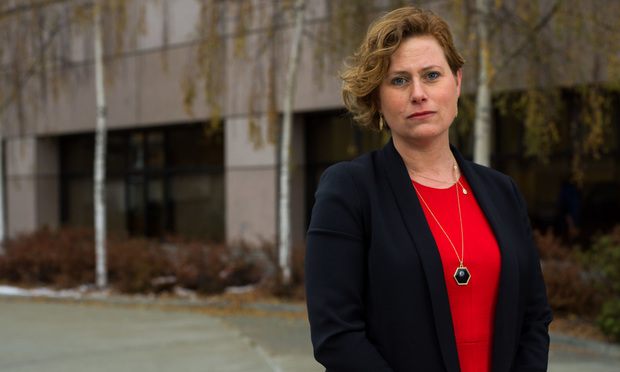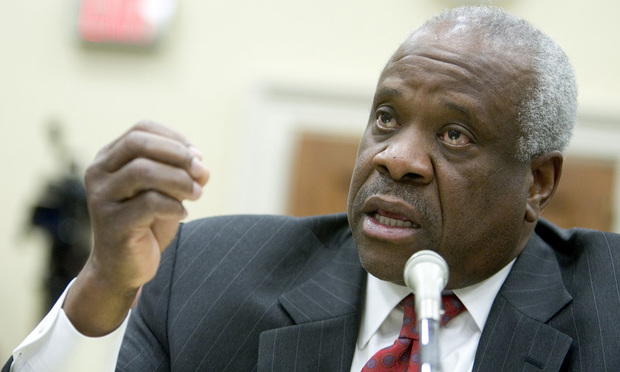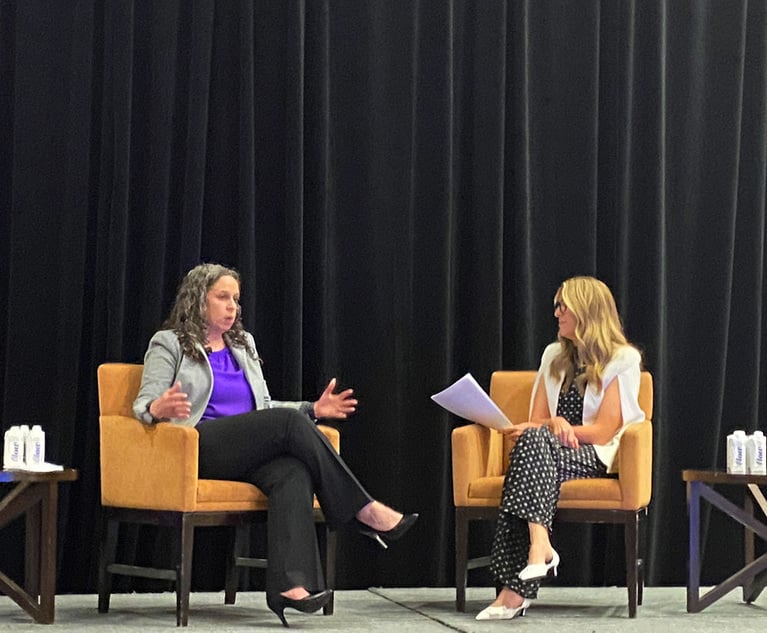A New York magazine report published Sunday put new scrutiny on Justice Clarence Thomas, raising fresh questions about his turbulent U.S. Senate confirmation hearings amid the national dialogue now about the suppression of sexual misconduct claims against men in power.
Thomas’s 1991 Supreme Court hearings before the Senate Judiciary Committee riveted the nation when Anita Hill came forward to testify that Thomas allegedly made inappropriate comments to her that amounted to sexual harassment. Hill had worked with Thomas at the U.S. Department of Education and the Equal Employment Opportunity Commission. Thomas denied Hill’s charges. The Senate confirmed Thomas, now 69, by a vote of 52-48.
“There were four women who wanted to testify, or would have if subpoenaed, to corroborate aspects of [Anita] Hill’s story. My new reporting shows that there is at least one more who didn’t come forward. Their ‘Me Too’ voices were silenced,” Jill Abramson, the author of the new report, wrote. Abramson is a former New York Times executive editor who co-wrote with Jane Mayer the 1994 book “Strange Justice: The Selling of Clarence Thomas.”
Abramson’s report in New York magazine—titled “The Case for Impeaching Clarence Thomas”—opened with a recounting of claims against Thomas, first published by The National Law Journal in October 2016, from a lawyer named Moira Smith.
Smith, now a general counsel in Alaska, alleged Thomas groped her at a dinner party in 1999 at the Virginia home of the executive director of the Harry S. Truman Foundation. Thomas was a guest that night, and Smith was a 23-year-old Truman Foundation resident scholar at the time.
Smith told the NLJ she opened up about the alleged inappropriate contact amid the spotlight on then-candidate Donald Trump’s alleged sexual transgressions.
“We now know that many men in power take advantage of vulnerable women. That willingness by men in power to take advantage of vulnerable women relies on an unspoken pact that the women will not speak up about it,” Smith told the NLJ in an interview in 2016. “Why? Because they are vulnerable. Because they are star-struck. Because they don’t want to be whiners. Because they worry about their career if they do speak out. But silence no longer feels defensible; it feels complicit.”
 Moira Smith (October 2016). Credit: Ash Adams
Moira Smith (October 2016). Credit: Ash Adams
Smith also told the NLJ: “Donald Trump said when you’re a star, they let you do it; you can do anything. The idea that we as victims let them do it made me mad. Sure enough, Justice Thomas did it with I think an implicit pact of silence that I would be so flattered and star-struck and surprised that I wouldn’t say anything. I played the chump. I didn’t say anything.”
Thomas denied Smith’s groping allegation, telling the NLJ: “This claim is preposterous and it never happened.”
Abramson said re-examination of the Thomas confirmation hearings are “worth looking closely at, because, as Smith’s account and my reporting since indicates, Thomas’s inappropriate behavior—talking about porn in the office, commenting on the bodies of the women he worked with—was more wide-ranging than was apparent during the sensational Senate hearings, with their strange Coke-can details.”
Thomas declined to comment on Abramson’s report, and a Supreme Court spokesperson did not immediately comment in response to a request from the NLJ.
Former Thomas clerk Carrie Severino of the Judicial Crisis Network said in a tweet Sunday night the New York magazine report was “a boring rerun of discredited allegations from the 1990s.”
In her article, Abramson recounted how three of the four women who were prepared to support Hill’s testimony—Angela Wright, Sukari Hardnett and Rose Jourdain—were not called to testify by then-Judiciary chairman Joseph Biden but had their testimony submitted for the record. The fourth woman, Lillian McEwen, a lawyer who had dated Thomas, said in a New York Times interview years later that she had written to Biden before the hearings to say she had personal knowledge of Thomas but she was not called to testify by any side.
The new woman who would not come forward at the time, according to Abramson’s report, is Nancy Montwieler, who covered the EEOC and Thomas, its chairman, for the Bureau of National Affairs (now Bloomberg BNA).
Abramson said a Washington lawyer contacted her last year to say Montwieler, then a colleague, had told her at the time that Thomas had made sexual comments to her. Montwieler reportedly declined to come forward at the time because she considered Thomas a “source.”
Montwieler declined to answer questions about Thomas from Abramson. Still, according to Abramson’s report, Montwieler did not deny her former colleague’s account to Abramson. The NLJ has not reached the former colleague.
Montwieler, reached by the NLJ after the publication of Abramson’s story, said she sent a message to New York magazine on Monday that read in part: “I knew Clarence Thomas in a professional capacity and never experienced any type of inappropriate behavior from him. Moreover, despite allegations in the article, I do not recall any conversations with Justice Thomas regarding inappropriate or non-professional subjects.”
Montwieler declined to answer questions posed by the NLJ about her former colleague’s statements and about Montwieler’s interaction with Abramson.
The judiciary’s #MeToo challenge
The new, national scrutiny of sexual harassment in the workplace has reached within the judiciary’s walls.
Prominent federal appeals judge Alex Kozinski in December retired following reports of alleged sexual misconduct. The Washington Post reported that nine women accused Kozinski, a former chief judge of the U.S. Court of Appeals for the Ninth Circuit, of making inappropriate comments. Four of the women claimed he touched them inappropriately.
In his year-end report, Chief Justice John Roberts Jr. said the judiciary is “not immune” from harassment, and he called on the formation of a working group to study.
“We have a new challenge in the coming year,” Roberts wrote in December. “Events in recent months have illuminated the depth of the problem of sexual harassment in the workplace, and events in the past few weeks have made clear that the judicial branch is not immune.”
On Thursday in Washington, Thomas, appearing at a Library of Congress event, repeated his refrain that he thinks the confirmation process is broken. He said he does not harbor “bitter feelings” about confirmation but is “sober” in his judgment. Thomas added: “A lot of the difficulties are irrelevant to the jobs.”
“I don’t think the process is what it ought to be. These are serious jobs, and I think that they should be serious. I don’t think they should become spectacle. This is not the Roman Colosseum. We’re not gladiators,” Thomas said Thursday. “And I think we’re going to lose some of our best people who choose not to go through the ordeal. They don’t want to have to fight the lion in order to be a judge or to be in government. And I think it’s our own fault for allowing this to happen. I was confirmed five times in 10 years, and it got increasingly worse.”
Read more:
Young Scholar, Now Lawyer, Says Clarence Thomas Groped Her in 1999
Clarence Thomas Derides ‘Myth-Making’ of Supreme Court Justices
Legal Heavy Hitters Line Up Behind ‘Time’s Up’ Launch
In Defense of Clarence Thomas, Skepticism of Alaska Lawyer’s Grope Claim
Roberts Year-End Report: Judiciary ‘Not Immune’ from Sexual Harassment
NOT FOR REPRINT
© 2024 ALM Global, LLC, All Rights Reserved. Request academic re-use from www.copyright.com. All other uses, submit a request to [email protected]. For more information visit Asset & Logo Licensing.


 Justice Clarence Thomas (2015). Credit: Diego M. Radzinschi/ ALM
Justice Clarence Thomas (2015). Credit: Diego M. Radzinschi/ ALM





